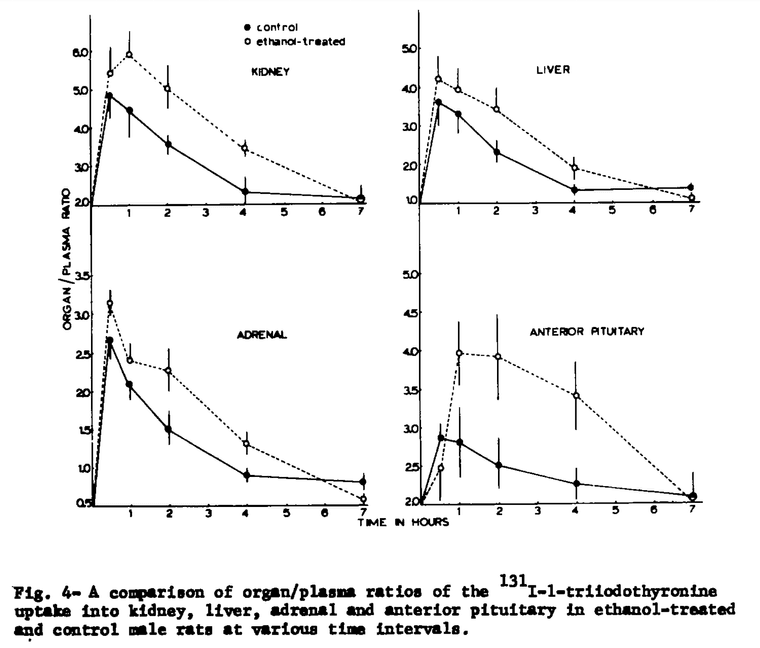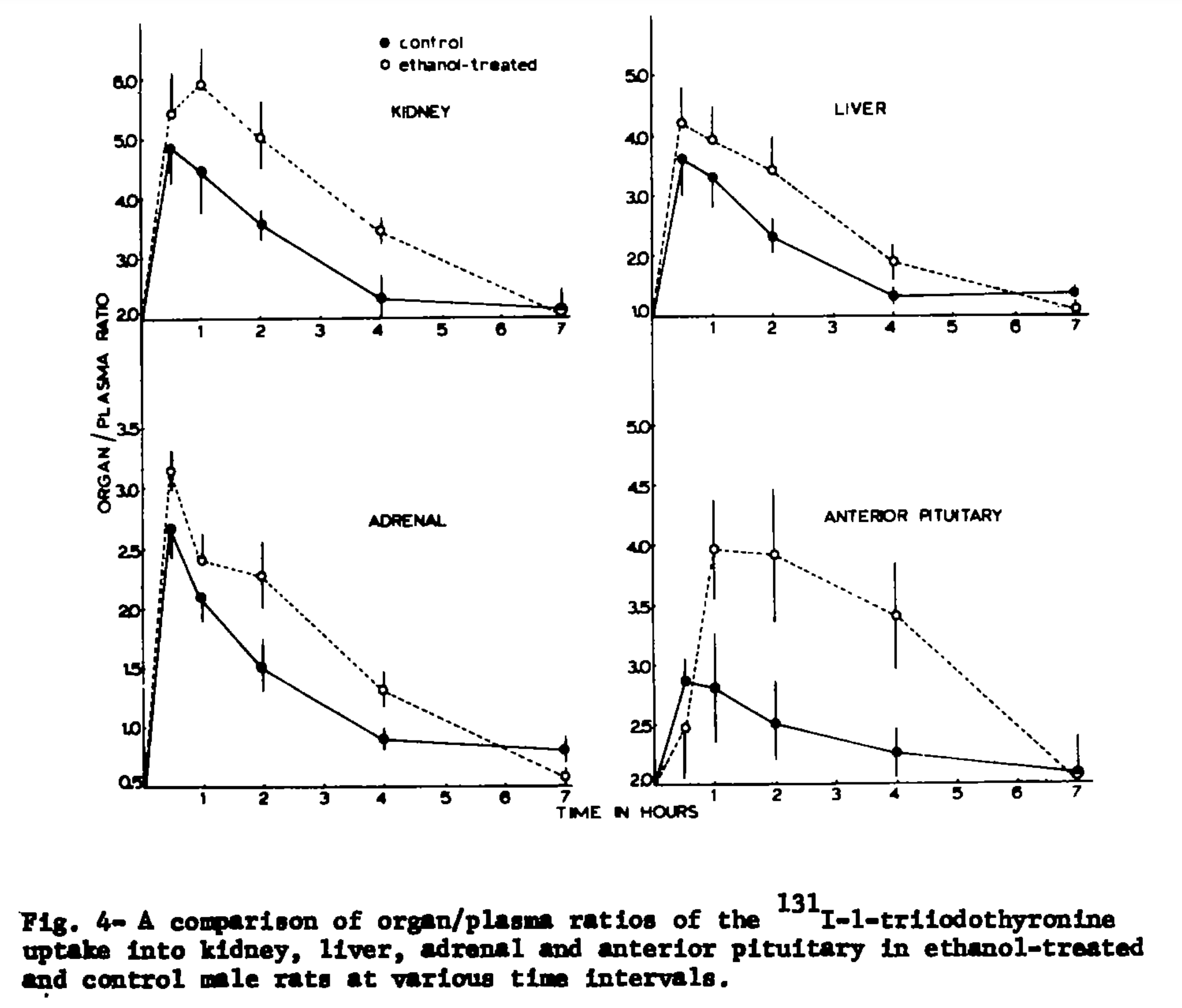The pro-thyroid effects of ethanol (lowered TSH & reverse T3, increased uptake and thyroid receptor expression)
-
A little-known fact about ethanol is that it acutely induces a hypermetabolic state.
"Effects of acute ethanol ingestion on liver include rapid increase in metabolic energy state, production and export of acetate, suppression of long chain fatty acid oxidation and synthesis, increased β-hydroxybutyrate/acetoacetate ratios, and under production of glucose by gluconeogenesis".
https://www.sciencedirect.com/science/article/pii/S0306987720300797"An intriguing hypothesis is that the effect of prolonged ethanol ingestion has a similar effect to the action of thyroid hormone on the liver (16). A “hypermetabolic state” (1) (the effect of which is excess oxygen consumption) exists in such circumstances"
https://aasldpubs.onlinelibrary.wiley.com/doi/pdf/10.1002/hep.1840030420A possible mechanism for this effect is ethanol’s interaction with the thyroid system. Rather than increasing thyroid hormone secretion, ethanol appears to remove obstacles in the thyroid hormone pathway, allowing more of it to enter cells and activate its receptor.
Firstly, in humans, ethanol appears to lower TSH without affecting circulating thyroid hormone levels. This suggests that it increases the thyroid gland’s sensitivity to TSH signals.
"Ethanol 1.0 g/kg suppressed plasma TSH to 1.4 +/- 0.2 mU/L (P < 0.05 at 0100 h and P < 0.01 at 0200 h). According to the area under the curve analyses, the suppression in the nocturnal TSH was 32% in the 0.5 g/kg group and 45% in the 1.0 g/kg group (P < 0.05 for both cases)...In conclusion, small amounts of ethanol have unexpectedly great effects on nocturnal surges of TSH, and especially on those of GH, that are apparently mediated by suprapituitary mechanisms."
https://pubmed.ncbi.nlm.nih.gov/8675588/In vitro study suggesting ethanol has stimulatory effects to the thyroid gland, acting as a TSH mimetic:
"Ethanol stimulated iodide uptake in a dose-response manner in TSH-free medium. Ethanol augmented the effect of TSH on iodide uptake, iodide organification, and thyroid hormone formation in the presence of 20-80 microU/ml TSH."
https://pubmed.ncbi.nlm.nih.gov/8380371/Secondly, in rats, it decreases the production of reverse T3
"In the fed state, hepatic rT3 neogenesis in animals given ethanol declined relative to the levels observed in control fed rats; fasting restored the depressed rT3 neogenesis to the levels noted in the fed state. Because decreased rT3 production in ethanol-treated rats in the fed state could not be explained on the basis of a change in 5'-deiodinase activity, it is suggested that ethanol administered with a nutritionally adequate diet may inhibit hepatic rT3 generation by inhibiting T4(5)-deiodinase."Thirdly, it increases the celluar uptake of thyroid hormones
In vitro:
"Acute administration of ethanol in doses of 4 and 6g/kg significantly increases the uptake of (131)I-labelled thyroxine by the liver."
https://europepmc.org/article/pmc/pmc1177839In vivo:
"The ethanol-treated animals had higher levels of 131-I activity in the anterior pituitary, adrenal, kidney and liver as compared to the control animals. Also, the kidney and anterior pituitary of the ethanol-treated animals attained their maximal concentrations later than did comparable tissue from the control animals. "
https://www.sciencedirect.com/science/article/abs/pii/0024320569902768

Ethanol increases thyroid hormone expression in vitro:
"Chronic ethanol consumption increases the amount of mRNA for retinoic acid and triiodothyronine receptors in mouse brain"
https://pubmed.ncbi.nlm.nih.gov/8710190/ -
@alfredoolivas I personally notice much higher temps, a faster resting heart rate and reduced stress when I start my day with 3 shots (75ml of vodka) mixed with orange juice. It greatly reduces the stress reaction to coffee. I do this every day, apart from when I am driving or operating machinery/doing labour that has health and safety risks.
-
@alfredoolivas said in The pro-thyroid effects of ethanol (lowered TSH & reverse T3, increased uptake and thyroid receptor expression):
A possible mechanism for this effect is ethanol’s interaction with the thyroid system. Rather than increasing thyroid hormone secretion, ethanol appears to remove obstacles in the thyroid hormone pathway, allowing more of it to enter cells and activate its receptor.
Firstly, in humans, ethanol appears to lower TSH without affecting circulating thyroid hormone levels. This suggests that it increases the thyroid gland’s sensitivity to TSH signals.
Great thread. Just don't forget to pay the piper.
There may be other ways to "remove obstacles" if and while a debt is paid.
https://leadtheway.substack.com/p/thyroid-and-water-homeostasis
